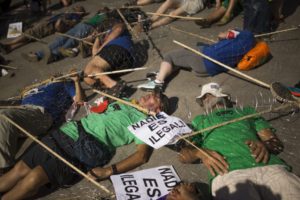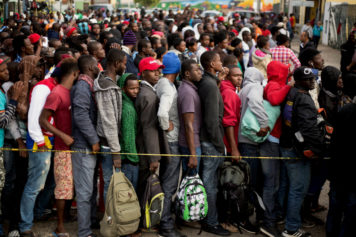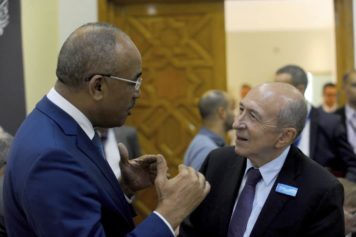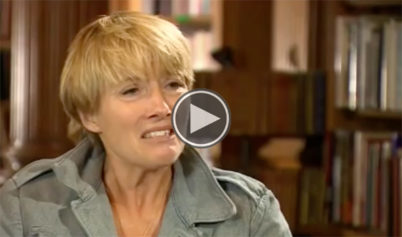
People covered with wire representing border razor wire fences lie down on the ground during a protest in support of migrant people seeking to enter Europe. (AP Photo/Francisco Seco)
MILAN (AP) — With Italians showing increasing discontent over unabated migrant arrivals and European partners not responding to pleas to ease Italy’s burden, the country’s leaders are considering what many have dubbed the nuclear option: approving emergency visas for migrants that could allow them unrestricted travel in Europe.
Premier Paolo Gentiloni is under growing domestic pressure over the migrant crisis, as more than 85,000 migrants have arrived in Italy in the first half of this year, a 20-percent increase over last year. Asylum requests are up by 25 percent.
The emergency visa proposal was not on the agenda when foreign ministers met in Brussels on Monday, but it was a hot topic on the sidelines.
Italian Foreign Minister Angelino Alfano denied media reports that 200,000 visas could be issued under the plan. But other Italian officials have acknowledged the plan is being considered, if only to gain negotiating leverage at the EU table.
“It is not a threat. It is an instrument of persuasion,” Italian Senator Luigi Manconi of the Democratic Party told private Sky TG24 this weekend. He confirmed that the idea was being studied by Interior Minister Marco Minniti.
A deputy in the foreign ministry, Mario Giro, acknowledged that Italy lacks leverage in Brussels.
“At the moment, we don’t have a strong negotiating power, but we need to find allies,” he told Sky.
Gentiloni has already had to abandon one proposed legislative measure to tackle the migrant crisis. Amid a political backlash, he has withdrawn from the Senate consideration of a new citizenship law for migrant children until after the summer break.
Opponents of the law, which has passed in the lower house, have leveraged on the crisis — even though no migrants arriving in recent waves would be immediately eligible under the five-year legal residency requirement.
Meanwhile, mayors throughout Italy, particularly in the south, are revolting against the government’s attempts to relocate migrants to their midst. In one Sicilian town, Castel’Umberto, the mayor joined a protest that temporarily blocked 50 migrants from a hotel this weekend. He will join some 40 mayors from the area around Messina, which is expecting thousands of new arrivals, in a meeting with the local prefect later this week.
All of this has pushed Gentiloni’s hand.
Italy’s neighbors are worried that the proposed visas could allow migrants to continue their journey to other European countries.
Austria has repeated threats to close its borders, with Interior Minister Wolfgang Sobotka telling Bild Zeitung on Tuesday that it could have soldiers at the Brenner Pass border — one of the main routes connecting Italy with northern Europe — within 24 hours “if the number of illegal migrants toward Austria increases more.”
Austria’s foreign minister told reporters in Brussels that redistributing migrants was not the answer, rejecting the issuance of emergency visas by Italy as well as any European Union plan to relocate migrants to central and northern Europe.
“It cannot be that Italy and Greece get relief by allowing more people to travel north. If that is the case, more people will follow, traffickers will earn more and more people will drown in the sea. Nothing will be solved,” Sebastian Kurz told reporters in Brussels.


